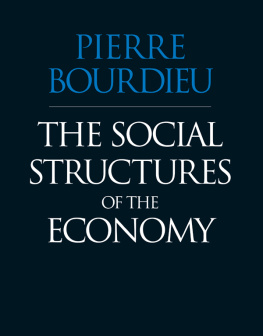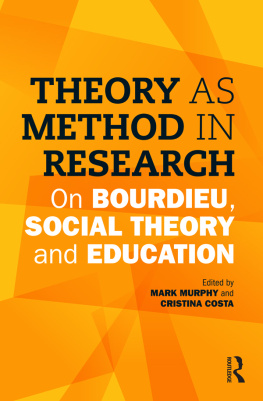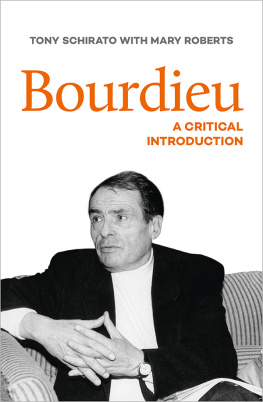Will Atkinson - Bourdieu and After: A Guide to Relational Phenomenology
Here you can read online Will Atkinson - Bourdieu and After: A Guide to Relational Phenomenology full text of the book (entire story) in english for free. Download pdf and epub, get meaning, cover and reviews about this ebook. year: 2019, publisher: Routledge, genre: Romance novel. Description of the work, (preface) as well as reviews are available. Best literature library LitArk.com created for fans of good reading and offers a wide selection of genres:
Romance novel
Science fiction
Adventure
Detective
Science
History
Home and family
Prose
Art
Politics
Computer
Non-fiction
Religion
Business
Children
Humor
Choose a favorite category and find really read worthwhile books. Enjoy immersion in the world of imagination, feel the emotions of the characters or learn something new for yourself, make an fascinating discovery.

- Book:Bourdieu and After: A Guide to Relational Phenomenology
- Author:
- Publisher:Routledge
- Genre:
- Year:2019
- Rating:3 / 5
- Favourites:Add to favourites
- Your mark:
Bourdieu and After: A Guide to Relational Phenomenology: summary, description and annotation
We offer to read an annotation, description, summary or preface (depends on what the author of the book "Bourdieu and After: A Guide to Relational Phenomenology" wrote himself). If you haven't found the necessary information about the book — write in the comments, we will try to find it.
Pierre Bourdieu was the most influential sociologist of the late 20th century. The framework he developed continues to inspire countless researchers across the globe and provokes intense debates long after his death. Novel concepts, innovative applications and countless elaborations spring up every day, bulking out and shaping a distinct, if not always entirely consistent, body of work that might be characterised as a recognisable tradition. For those coming to Bourdieu for the first time, therefore, and interested in using his ideas in their own research, it no longer makes sense to confine oneself to the ideas of the man himself. An overview of the varied ways his concepts and arguments have been deepened and updated to make sense of new times or to fill certain gaps, and how insights on seemingly disconnected topics weave together into a bigger picture, is not just desirable but essential.
Bourdieu and After aims to provide exactly this overview. Working closely with Bourdieus own writings, but also covering a wide range of research and literature inspired by him, it aims to guide the reader through the key principles, the major and minor concepts and the concrete findings of Bourdieusian sociology as clearly and comprehensively as possible. It explains the difficult and often overlooked philosophical foundations, walks through the logic of famous terms like field, habitus and capital and demonstrates how they have been or can be used to provide powerful accounts of colonialism, the emergence of nation states and the rise of global social relations. It covers topics that Bourdieu was famous for analysing, like class and educational inequality, yet also traverses subjects on which he said little but that others influenced by him have tackled in depth, such as ethnicity, sexuality and family.
Along the way Atkinson seeks to undermine some of the common criticisms levelled at Bourdieu while identifying remaining gaps and limitations. Rather than simply recognising the problems, however, Atkinson proposes possible solutions too solutions that are facilitated, he argues, by characterising Bourdieusian sociology as what he calls relational phenomenology.
Will Atkinson: author's other books
Who wrote Bourdieu and After: A Guide to Relational Phenomenology? Find out the surname, the name of the author of the book and a list of all author's works by series.








